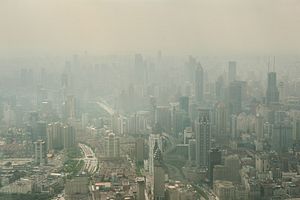Coal has long been a fixture in China. First used by Neolithic peoples in the Shenyang area six millenia ago, coal from a mine in northeastern China was used to stoke fires for smelting copper at least three millenia ago. By the time Marco Polo arrived in the 13th Century, coal was so ubiquitous that many Chinese were able to enjoy the downright decadent luxury of a hot bath three times per week. The fuel is just as prevalent in modern times: by 1983, China was the world’s foremost producer of coal, and by 2011, it was producing 3,520 million metric tons of it, just under half of the total production of coal on Earth that year. That was still not enough to meet the Middle Kingdom’s demand; China imported 195 million metric tons the year prior in an effort to stay abreast of consumption.
By the latter half of the last century, the dangers of coal use had become apparent. Despite the fact that ignorance has ceased to be a valid excuse, the heavy toll that coal’s overuse has wrought is becoming worse and worse. Coal is the country’s biggest source of air pollution and greenhouse gases, and, according to one study, rampant coal burning caused 330,000 premature deaths in 2013 alone. Coal is responsible for about forty percent of the particulate matter that is 2.5 microns in diameter or less in China’s air (known as PM2.5), which are able to travel deep into the respiratory system and cause long-term health problems.
Cutbacks, modest or otherwise, are simply not happening. China’s coal industry is inseparable from its cement, steel and aluminum industries, and the latter have been running at economically unsustainable levels for quite some time. China’s State Council recently announced it would crack down on environmental standards as a way of dealing with overcapacity, indicating that it would fine, close down, and even destroy the equipment of significant polluters. Government officials would be given the power to shut off energy and water to offending operators, and physically seal off access to enterprises that were closed for noncompliance to prevent them from reopening.
Unfortunately, as has been noted previously, these intentions often get watered down at a local level where officials appear keener to safeguard employment at the expense of clean energy policies. Local governments are known to use gaping loopholes to short-circuit environmental enforcement, like registering polluting firms as financial enterprises or equipment sales outfits so as to exempt them from environmental standards. Indeed, thanks to China’s Byzantine bureaucracy, there’s plenty of room for polluters to slip through the government’s cracks.
Flummoxing regulators further is the fact that most, if not all, players are significant polluters. In the aluminum industry alone, pollution levels are running roughshod over stated limits. About eighty percent of China’s aluminum capacity violates emissions standards. Over five dozen aluminum smelters violate standards for particulate matter, some of which belch forth over three times the allowable limit. According to reports, the smelters in violation “all release between 10.3 mg/m3 and 31 mg/m3 of particulate matter, which is capable of causing atmospheric haze and serious health problems due to inhalation.” The offending smelters are from across the entire spectrum of China’s aluminum industry as well; smelters owned and/or operated by Hongqiao, CHALCO, Xinfa, SPIC, East Hope, JISCO, and Zengshi made the list.
Such blatant abuses were facilitated by corrupt officials looking to line their own pockets. Last year, former Ministry of Environmental Protection (MEP) Vice Minister Zhang Lijun found himself the target of a corruption probe. Zhang, who now has the ignominy of being the most senior environmental official yet investigated for corruption, is suspected of influence peddling, accepting bribes, and undermining the market economy. While serving in the ministry for nine years, he is alleged to have sold fraudulent quality-control certificates, awarding ostensibly competitive bids to companies with which he had personal ties, and sold fake or poorly operating environmental monitoring equipment. He has also been linked to organized crime, and is said to have used fake car accidents and illegal police detentions to discourage competitors.
Remedying overcapacity by addressing it head on has fared scarcely better. Despite ambitious promises made by Xi Jinping to undertake economic restructuring and deal with problems of oversupply through supply side reforms, there has been precious little progress made in implementation. Xi inherited a 2008 initiative to eliminate excess steel capacity in order to buoy an industry that was foundering. Eager to please their higher-ups, local officials took the ball and ran with it, mowing down and even blowing up steel plants to scale back capacity. However, after the initial push faded, the locals resumed business as usual. Instead of physically destroying capacity, many localities now simply advise a steel mill to shut capacity temporarily until prices rise, creating a vicious, inescapable cycle.
Strengthening environmental standards for heavy industry and cracking down on overproduction are all laudable goals. However, China’s leadership must commit to developing and implementing workable solutions for enforcing these measures on a local level. Punishing high-level officials who fail to enforce environmental dictates is unquestionably a necessity, but an equally zealous enforcement effort must take place outside of Beijing, where the majority of China’s rampant and deadly pollution goes unpunished. China’s failure to deal with both problems will continue to depress commodity markets and the health of the Chinese people at an alarming pace.
Chris Zhang, originally from China, now works as a New York-based sustainability advisor. He studied international affairs at Fudan University in Shanghai and is a keen observer of political corruption and environmental standards in China.

































